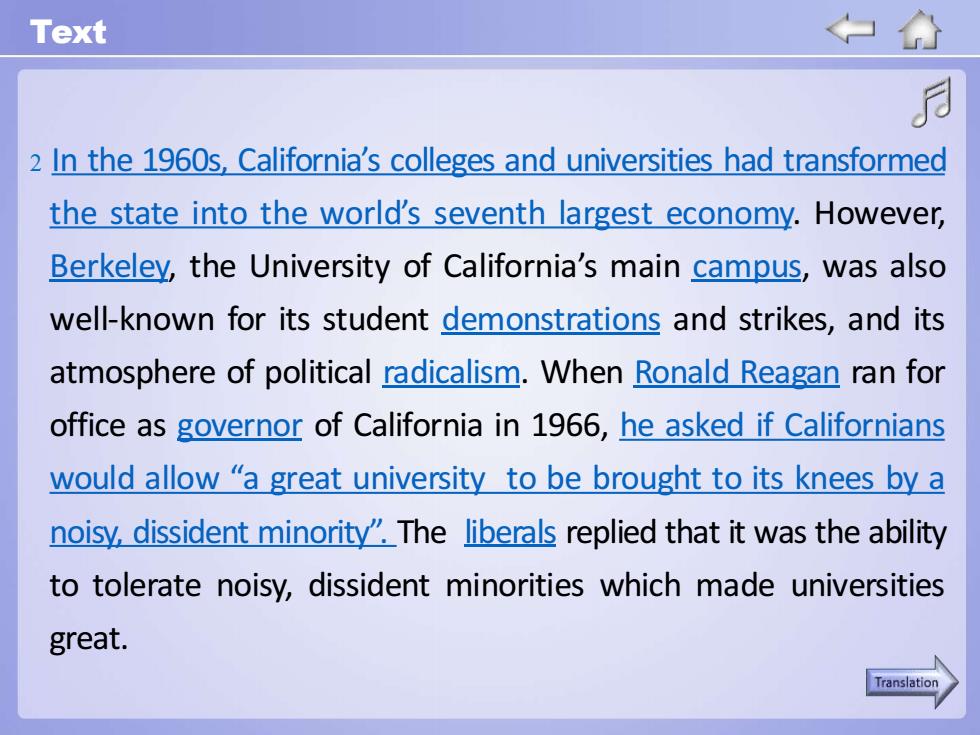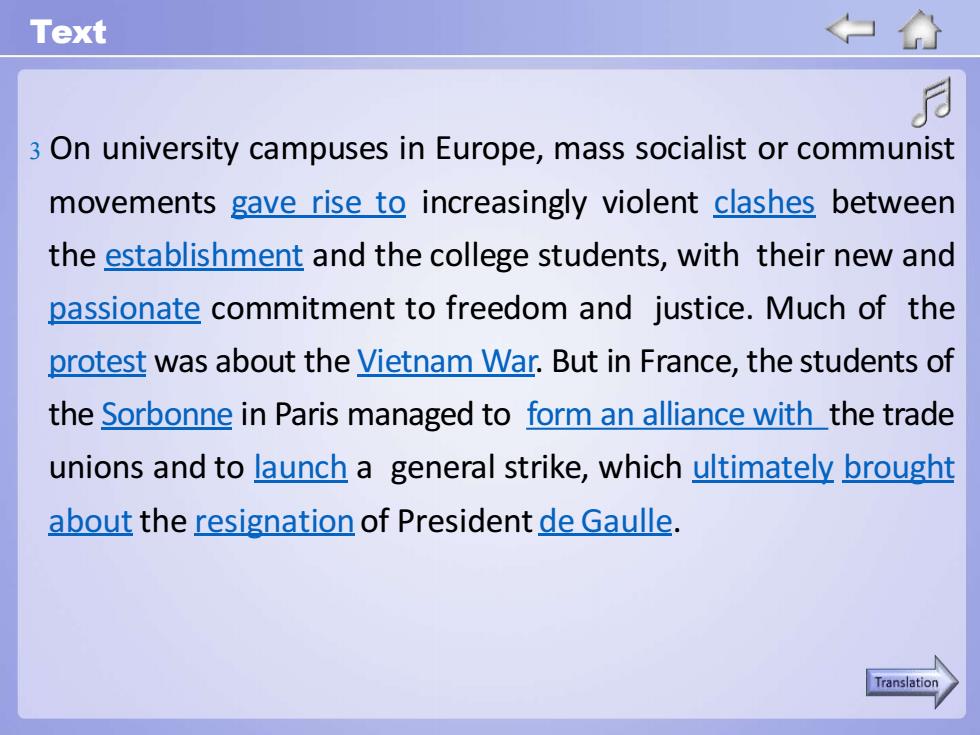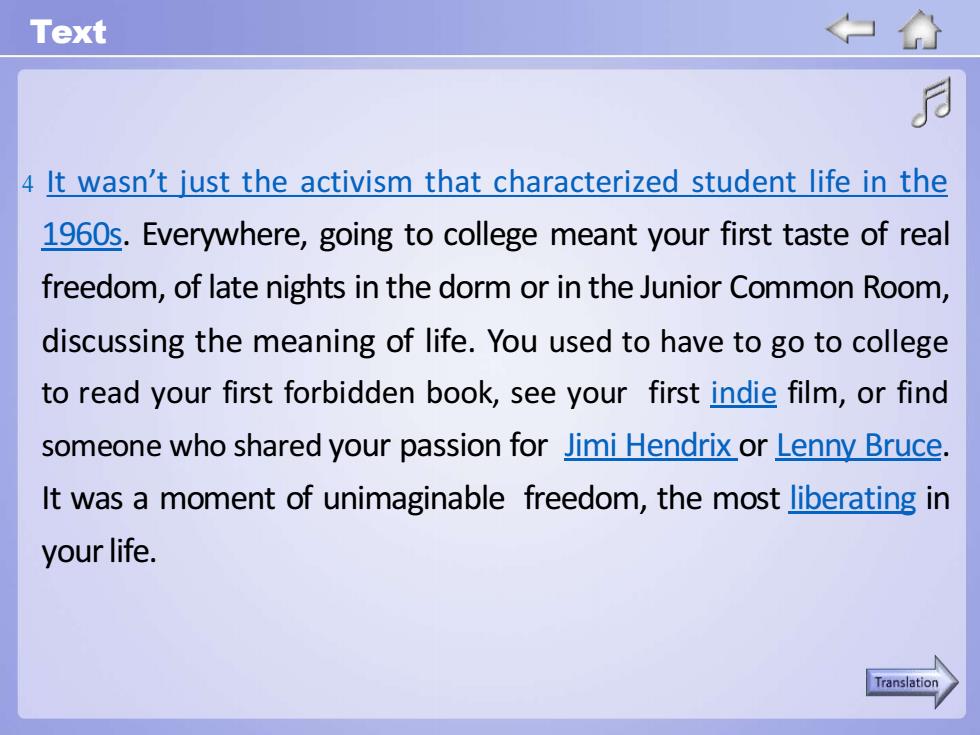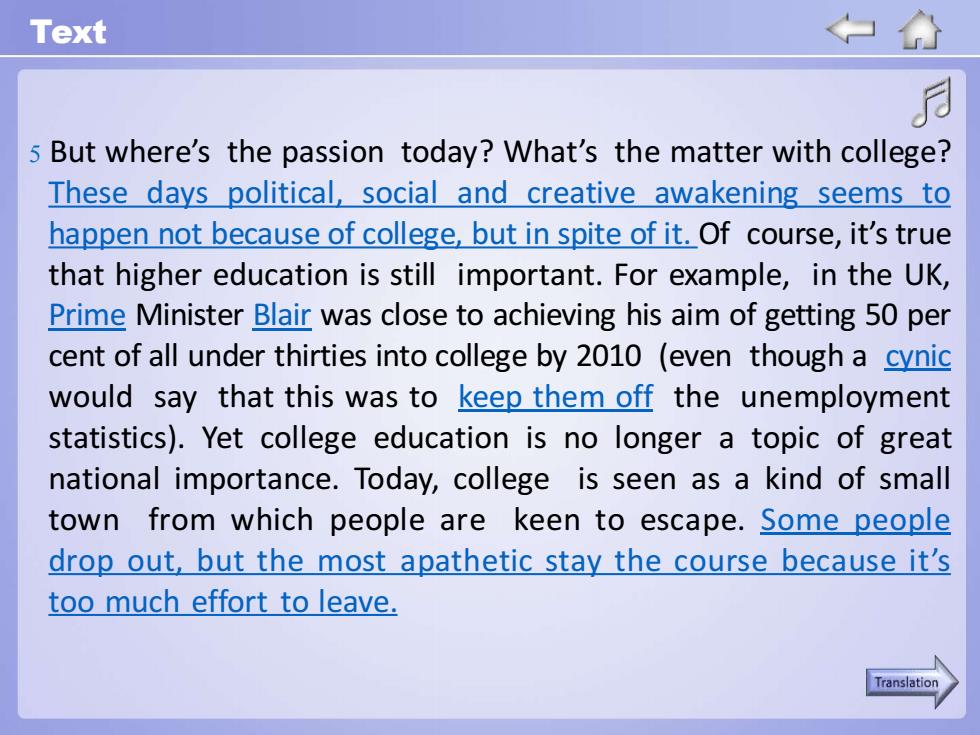
Text2 In the 1960s, California's colleges and universities had transformedthe state into the world's seventh largest economy. However,Berkeley, the University of California's main campus, was alsowell-known for its student demonstrations and strikes, and itsatmosphere of political radicalism. When Ronald Reagan ranforoffice as governor of California in 1966, he asked if Californianswould allow“a great university to be brought to its knees by anoisy, dissident minority", The liberals replied that it was the abilityto tolerate noisy, dissident minorities which made universitiesgreat.Translation
2 In the 1960s, California’s colleges and universities had transformed the state into the world’s seventh largest economy. However, Berkeley, the University of California’s main campus, was also well-known for its student demonstrations and strikes, and its atmosphere of political radicalism. When Ronald Reagan ran for office as governor of California in 1966, he asked if Californians would allow “a great university to be brought to its knees by a noisy, dissident minority”. The liberals replied that it was the ability to tolerate noisy, dissident minorities which made universities great. Text

Text3On universitycampusesinEurope,masssocialist orcommunistmovements gave rise to increasingly violent clashes betweenthe establishment and the college students, with their new andpassionate commitment to freedom and justice. Much of theprotest was about the Vietnam War. But in France, the students ofthe Sorbonne in Paris managed to form an alliance with the tradeunions andto launch a generalstrike,which ultimately broughtabouttheresignationofPresidentdeGaulleTranslation
Text 3 On university campuses in Europe, mass socialist or communist movements gave rise to increasingly violent clashes between the establishment and the college students, with their new and passionate commitment to freedom and justice. Much of the protest was about the Vietnam War. But in France, the students of the Sorbonne in Paris managed to form an alliance with the trade unions and to launch a general strike, which ultimately brought about the resignation of President de Gaulle

Text4 It wasn't just the activism that characterized student life in the1960s. Everywhere, going to college meant your first taste of realfreedom, of late nights in the dorm or in the Junior Common Room,discussing the meaning of life. You used to have to go to collegeto read your first forbidden book, see your first indie film, or findsomeone who shared your passion for Jimi Hendrix or Lenny BruceIt was a moment of unimaginable freedom, the most liberating inyourlife.Translation
4 It wasn’t just the activism that characterized student life in the 1960s. Everywhere, going to college meant your first taste of real freedom, of late nights in the dorm or in the Junior Common Room, discussing the meaning of life. You used to have to go to college to read your first forbidden book, see your first indie film, or find someone who shared your passion for Jimi Hendrix or Lenny Bruce. It was a moment of unimaginable freedom, the most liberating in yourlife. Text

Text5 But where's the passion today? What's the matter with college?Thesedays political, social and creative awakening seems tohappen not because of college, but in spite of it. Of course, it's truethat higher education is still important. For example, in the UK,Prime Minister Blair was close to achieving his aim of getting 50 percent of all under thirties into college by 2010 (even though a cynicwould say that this was to keep them off the unemploymentstatistics). Yet college education is no longer a topic of greatnational importance. Today, college is seen as a kind of smalltown from which people are keen to escape. Some peopledrop out,but the most apathetic stay the course because it'stoo much effort to leave.Translation
5 But where’s the passion today? What’s the matter with college? These days political, social and creative awakening seems to happen not because of college, but in spite of it. Of course, it’s true that higher education is still important. For example, in the UK, Prime Minister Blair was close to achieving his aim of getting 50 per cent of all under thirties into college by 2010 (even though a cynic would say that this was to keep them off the unemployment statistics). Yet college education is no longer a topic of great national importance. Today, college is seen as a kind of small town from which people are keen to escape. Some people drop out, but the most apathetic stay the course because it’s too much effort to leave. Text

Text6 Instead of theheady atmosphereof freedom which studentsin the 1960s discovered, students today are much moreserious. The British Council has recently done research intothe factors which help international students decide whereto study. In descending order these are: quality of courses,employmentprospects, affordability, personal securityissues, lifestyle, and accessibility. College has become ameans to an end, an opportunity to increase one's chances onthe employment market, and not an end in itself, which givesyou the chance to imagine, just for a short while, that you canchangetheworldTranslation
6 Instead of the heady atmosphere of freedom which students in the 1960s discovered, students today are much more serious. The British Council has recently done research into the factors which help international students decide where to study. In descending order these are: quality of courses, employment prospects, affordability, personal security issues, lifestyle, and accessibility. College has become a means to an end, an opportunity to increase one’s chances on the employment market, and not an end in itself, which gives you the chance to imagine, just for a short while, that you can change the world. Text